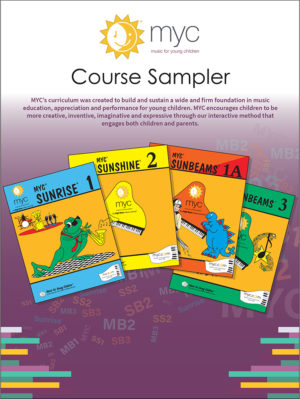MYC’s curriculum was created to build and sustain a wide and firm foundation in music education, appreciation and performance for young children. Our students not only learn how to play the piano and read music, but are also taught the other important elements (i.e. Sight-reading, composition and ensemble playing) that help create a solid, educated and well-balanced musician.

However, regardless of whether your child continues in music study after MYC®, our method provides your child with such a wide knowledge of musicianship and appreciation, that they will carry the love (and knowledge) of music with them throughout their lives.
MYC is the only early-childhood music education method that integrates and utilizes Conservatory repertoire within our own method, working towards each MYC graduate completing their first piano exam and theory exam.
Each concept that is taught (in MYC), is introduced and supported through the four learning styles (auditory, tactile, analytical and visual) to ensure that every child in MYC has the highest level of success in not only learning each concept, but also being able to apply and manipulate that information as needed.
MYC classes engage the four learning styles through incorporating the following essential elements and activities in every 1-hour, weekly lesson:

Singing
Listening
Children do love to listen – whether they show it or not! Children need to be taught how to listen, and for what elements they need to listen to, at different times. The ability to actively listen and identify different elements in music is essential to musical literacy. Our students learn and strengthen their listening skills through:
- Writing Rhythm Stories (with manipulatives) through dictation
- Playing back simple melodies on the piano (after hearing them)
- Active auditory analysis – teaching each child to be able to identify key elements of music, whether it is dynamics (volume), tempo (speed), articulation (touch) or chord-quality identification (i.e. major or minor sounds)
- Well-known melodies and composer or style identification
Homework
Keyword/Piano
“D is a Dreadful Dancing Dinosaur!” But he’s really not a bad guy, just a REALLY bad dancer, and needs to practice everyday. Our MYC students get excited and start learning about the keyboard geography by starting with a D-centred approach (this means that the children learn where the note D is on the keyboard and staff, then surrounding notes). Our children learn their keyboard reading skills through the wonderful MYC Critters (and their stories) that they can grasp and relate very easily – through incremental introduction and constant review.
In their final year of MYC (Moonbeams 3), MYC students move away from our MYC books for their repertoire (playing) material and use Conservatory books [i.e. Royal Conservatory (RCM), Conservatory Canada (CC), Associate Board (ABRSM)] in preparation of completing their Level1/Grade 1 piano exam. By Moonbeams 3 all “fun” MYC terminology has been replaced with standard music terminology and vocabulary to ensure a smooth transition to private lessons. Emphasis is also on technique, ensemble playing, arranging their music and harmonization of a melody line.
Rhythm Ensembles
Composition
Student Materials
For a more detailed breakdown of each level's goals and sample pages from the student manuals please have a look at our Course Sampler.

Course Sampler

